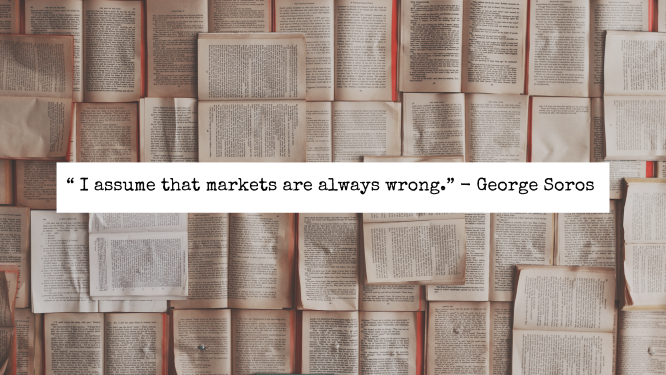Book of the Month 07-20
July 2020 – This month’s reading recommendation is from one of the most prolific investors of all time. CIO Scott Morrison remembers the time he had lunch with George Soros.

I first read this book back in the late 1990’s. I was excited to gain insights into how this legendary wealth fund manager had made so many correct macro calls on currencies, commodities, bonds and stocks.
Fast forward to 2010 and I was lucky enough to have lunch with Mr. Soros. The encounter is one of the ultimate highlights of my professional career. As a follow-up to that meeting, I was extended an invitation to meet his Chief Investment Office (CIO) when I next visited New York City. It was a fascinating discussion going over many investing subjects, but what I really wanted to know was “How did George Soros manage risk?”. With a laugh, his CIO gleefully answered, “George’s approach to managing risk is to make more money, so that when you lose money, it is from a higher and higher level!”
After stepping away from his fund, George Soros remains one of the world’s foremost philanthropists. He has given away more than $32 billion of his personal fortune to fund the Open Society Foundations’ work around the world. His investing legacy is an unique case study all investors can learn from.
Wise Words
“I am an important in shareholder… That means we share in the downside as well as on the upside, there is an identity of interest between the shareholders and the management. Therefore the unspoken understanding with our investors is that they are passengers in a car that we drive.”
“I do not play according to given set of rules; I look for changes in the rules of the game.”
“I am a very critical person who looks for defects in myself as well as in others. But, being so critical, I am also quite forgiving. I couldn’t recognize my mistakes if I didn’t forgive myself. To others, being wrong is a source of shame; to me, recognizing my mistakes is a source of pride. Once we understand that imperfect understanding is the human condition, there is no shame in being wrong, only in failing to correct our mistakes.”
“I am particularly keen on investment theses the market is hesitant to accept.”
“I watch for telltale signs that a trend may be exhausted.”
“There is nothing more self-destructive than to deny your feelings. Once you are aware of your feelings you may not feel the need to show them.”
“When you are taking risks if you make the right judgement, if you have the right insight, there is a divergence between your hypothesis and the actual course of events, you need to dome really serious research to find out what’s wrong. The less successful you are, the more you’re going to have to work to correct the situation. If the portfolio is doing well, you’ll have to work less. There is an inverse relationship.”
“…there are many people who love working. They amass an inordinate amount of information, much more than is necessary to reach a conclusion. And they become attached to certain investments because they know them intimately. I am different. I concentrate on the essentials. When I work, I work furiously because I am furious I have to work.”
“I believe that a thinking person is in a very difficult position, because he is trying to understand a situation in which he is one of the actors.”
“Classic economic theory assumes that market participants act on the basis of perfect knowledge. That assumption is false. The participant’s perceptions influence the market in which they participate, but the market action also influences the participants’ perceptions. They cannot obtain perfect knowledge of the market because their thinking is always affecting the market and the market is affecting their thinking.”
